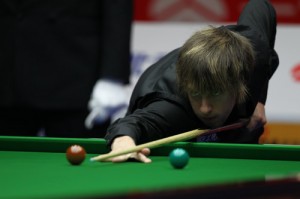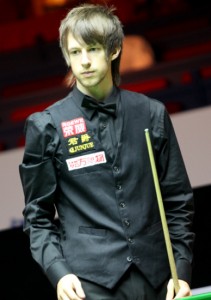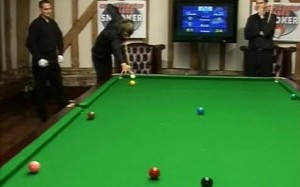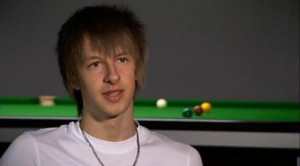
Today I take a look at the fortunes of Bristol’s Judd Trump who has recently been the subject of much debate among snooker fans. Is he the real deal or will he be another promising junior who will fail to realise his full potential?
Recently during one of my posts looking at the recent German Masters qualifiers I remarked on Judd Trump as being a player whose career has ‘stalled’ during the previous 18 months. This was picked up by Witz78 in the comments section who pointed out that Judd has made solid progress this season, winning a PTC event, qualifying for all three venues and moving up to 6th on my latest one-year ranking list.
Shortly afterwards came this thread on TheSnookerForum in which a few users have expressed doubt as to whether Judd will deliver on that promise in quite the way that was once expected of him.

So let’s take stock. Judd was of course known in snooker circles long before turning professional, indeed I have a DVD somewhere celebrating the now sadly defunct Heritage Room at the Crucible Theatre which features a very young Judd alongside a dark haired John Parrott. His junior achievements amongst other things included making a competitive maximum break at the age of 14, winning English titles at almost all age-levels and also making the semi-finals of both the Europe U-19’s and World U-21 events.
Entering the tour in 2005/6, expectations of Judd were sky high from the start with people labelling him as potentially the next Stephen Hendry, an impossible tag for any young player to live up to. So it proved as initially Judd struggled for wins, although he was able to retain his place on the circuit and in 2007 qualify for the Crucible for the first time where he would face former champion Shaun Murphy.
His real breakthrough season however was to come in 2008/9 as he qualified for a number of venues and notably defeated Ronnie O’Sullivan en route to his first appearance in a major semi-final at the Grand Prix. Although he failed to qualify for the Crucible at the end of the campaign, he did manage to win the Championship League having entered the tournament as its lowest ranked player and in doing so earn a place in the following season’s Premier League.
Following that season however, I had expected Judd, now up inside the top 32, to carry that form through into 2009/10 but for whatever reason it did not quite happen. Defeats to Marcus Campbell in each of the season’s opening two ranking events ended his bid for a top 16 place almost before it had started while he again failed to make it back to the Crucible, suffering a comprehensive 10-3 defeat at the hands of Leicester’s Tom Ford.
So far at least though, 2010/11 has seen something of a return to form for Judd as he has qualified for each of the venues and won one PTC event to move himself up to 6th on the one-year list and 26th on the latest official rankings.

But still the doubters remain.
The weight of expectation that has placed upon Judd is such that to some, his failure to win a major ranking event title by now is conclusive of the fact that he is not good enough. At first glance, the fact that Stephen Hendry, John Higgins, Ronnie O’Sullivan and Ding Junhui were all winning titles in their teens and Judd has not would seem to support this view.
It is not a train of thought however that I subscribe to. Generally speaking I do agree that the true legends of the sport do show something early, as the likes of Hendry did but there are plenty of players who have been somewhat later developers who have all gone on to have excellent careers. Take Mark Selby who despite reaching his first ranking event final aged 19, did not truly make his breakthrough until the 2007 World Championship.
Or what of twice ranking event winner and former World Championship finalist Ali Carter who after reaching his first ranking event semi-final at the age of 20, did not reach another for eight years, only moving into the top 16 at the age of 27. Interestingly enough Ali was also a player who won the Masters qualifying tournament at a young age.
Graeme Dott too is a player who did not reach the top 16 until he was 24 before eventually going on to win the World Championship and reach a further two finals. Even Nigel Bond, a former world finalist who did not even turn professional until he was 24.

My point therefore is that while he probably hasn’t achieved enough at the age of 21 to suggest that he is going to develop into one of the game’s all-time greats, there is no age-related reason why he cannot go on to win any of the game’s major tournaments.
Another factor to be taken into account too is the fact that the current standard in the game, not at the very top level, but across the board with so many capable players currently on the tour, arguably makes it harder for promising young players to break through and win titles on the tour.
This is for me something that is reflected in the current rankings as inside the top 50, at first glance I can see just four aged 24 or younger and none as young as Trump. If Judd is not to become a tournament winner once the current crop decide to hang up their cues, who will be? The likes of John Higgins cannot keep winning forever.
Exactly what Judd will have won by the time that he leaves the sport only time will tell. My gut feeling is that he will not emulate the achievements of say a Hendry or a Higgins and he will have to adapt his game if he is to win the very biggest titles. At 21 however he has plenty of time on his side and I cannot help but feel that some of the criticism levelled against him somewhat premature.
There have also been questions raised about Judd’s attitude and application, but I do not know him personally so cannot make any judgement on this myself.
Is Judd the real deal?
